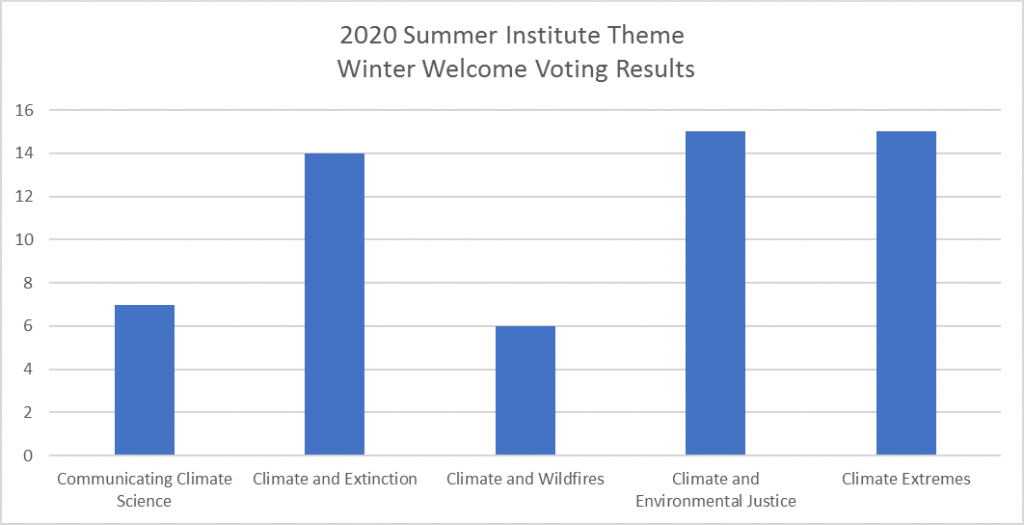The Program on Climate Change Winter Welcome 2020. In the Time Before.
On 25 February 2020, 80 climate scientists, educators and staff from across campus gathered in person to celebrate much that was new in the community for 2019/2020. What we did not realize at the time was that this was going to be one of the last face-to-face interactions we could have as a community for months. Two weeks later, on March 9 the University of Washington went to remote operations, finishing the winter quarter online. Practicing physical distancing as best we can, we now follow the governor’s order to “stay at home”, watching, hoping COVID—19 has begun to subside.
But back before, at our event in February, members of the Program on Climate Change community mingled over food and drink in the lobby of the Fishery’s Science Building. Welcoming the first of many firsts, this was catered by a new company, Tuxedo’s and Tennis Shoes. I had said my last goodbye to our regular caterer, Mangetout, who had retired at the end of 2019. While mingling we were all encouraged to vote for the next summer institute theme, another first for the PCC community.
The winter welcome was about celebrating the new—this was Becky Alexander’s first Winter Welcome as the PCC Director. We gathered for this more formal part of the evening in the FSH auditorium, where Becky welcomed and introduced two new PCC graduate fellows, two new staff at the Climate Impacts Group, new PCC Board members and new members of the graduate student steering committee (PGraSC).
New postdocs have the opportunity to introduce themselves, a feature of this event that was first started under the leadership of LuAnne Thompson several years ago.
Ten postdocs and one interdisciplinary fellow had 3 minutes to share a bit about themselves and their interests.

- Maddie Smith, Applied Physics Lab. Arctic Sea Ice: Observations & Modelling
- Sara Sanchez, Atmospheric Sciences & JISAO. Coral archives as way to constrain variations in tropical temperatures and precipitation/evaporation.
- Lettie Roach, Atmospheric Sciences. Sea Ice Modeling
- Brandon Montemuro, Oceanography. Sea ice model parameterization.
- Jessie Pearl, USGS & ESS. Spatial and temporal patterns of natural and forced climate.
- Justin Penn, PCC interdisciplinary graduate fellow, Oceanography. Marine extinction risk from climate warming.
- Tyler Sutterley, Applied Physics Lab. Monitoring the behavior of the Greenland and Antarctic ice sheets with satellite and airborne measurements.
- Marie McGraw, Atmospheric Sciences. How can we make better forecasts of sea ice, especially extreme sea ice events, on day-to-day timescales?
- Dhruv Balwada, Oceanography. Do ocean wrinkles matter?
We also celebrated the graduate students who had completed the certificate and associated capstone projects, which you can read about here.
As the presentation concluded, the results of the Summer Institute voting were shared:
Armed with the enthusiasm of the community for several themes, we move to conversations of how to move forward and organize around a single them. Our next PCC Board meeting will be virtual, and we will tackle the big question, of how to organize in this time of great uncertainty.
Nearly 6 weeks after the winter welcome, amidst sadness and confusion, we soldier on virtually. Classes have begun again online, meetings and conferences are cancelled, postponed, or held virtually. PCC leadership, those old and new to our advisory teams must make hard decisions and operate in a world a great deal more uncertain than it was before. In the time before.
By Miriam Bertram
Assistant Director UW Program on Climate Change
@CliEdMiriam
April 5, 2020



